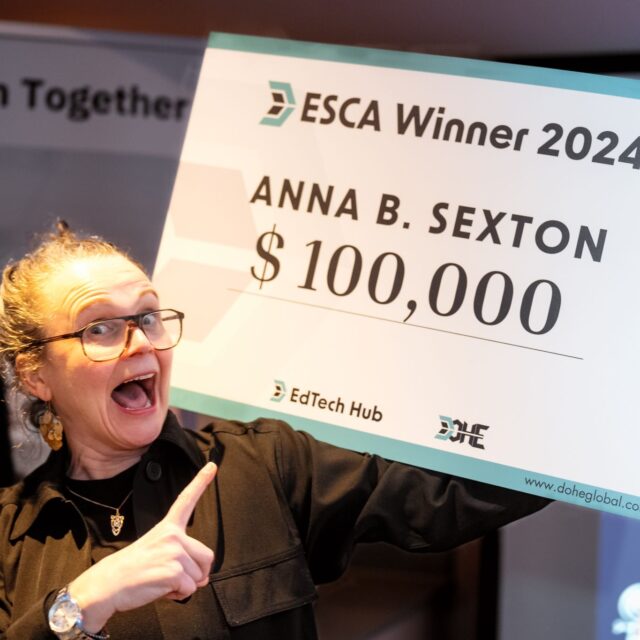The Royal Academy of Engineering officially opens a new Enterprise Hub at Central Tech in Liverpool this week, designed to support local engineering and technology innovators and entrepreneurs with equity-free funding, smart and flexible training and mentoring from industry experts.
Liverpool will be the Academy’s fifth location outside of London, alongside Belfast, Swansea, Glasgow and Newcastle. Led by Senior Enterprise Manager Ben McAlinden and based in the heart of the city’s Knowledge Quarter, the Hub in Liverpool will seek to support bold, IP-rich innovations from all areas of engineering and technology, from across the wider North West region, striving to solve the world’s most complex environmental, economic and social challenges.
The Academy believes the Liverpool City Region has all the ingredients to be a hive of deep-tech companies, as the home of two science and innovation districts with strengths in sectors like advanced manufacturing, life sciences, new materials and AI technology. The Liverpool City Regional Combined Authority and the Liverpool City Metro Mayor have also set out a clear path to deliver growth with their Plan for Prosperity. The plan highlights a “relentless focus on innovation”, capitalising on the city’s green industrial revolution and turning citizens’ potential into prosperity.
Translating local STEM capability into jobs
Liverpool’s three main universities have a wealth of science, engineering and technology talent, with: 53% of higher education students in the area enrolled in STEM courses, surpassing regional (50%) and national (45%) averages. Within STEM enrolments, 7% are in engineering and technology. Liverpool City Region also has 1,929 postgraduate STEM students per 100,000 students compared to 650 nationally. Although the city has an excellent inheritance in terms of STEM skills, it suffers from low growth and employment in sectors like engineering and technology. The Plan for Prosperity aims to leverage this science and technology base to increase the numbers of knowledge intensive businesses from 22% to the national average of 26%.
Research base strength
Liverpool’s universities are major assets, both locally and nationally, with impressive high quality research and impact track record. According to the UK Research Excellence Framework, outputs are deemed world-leading (4*) or internationally excellent (3*). In the case of Liverpool engineering research, 100% are in those two top categories, compared to 76% nationally. Liverpool universities also have the ability to attract significantly higher levels of research councils funding than the national average (£170 per capita compared to £70 nationally). The translation of this research into commercially viable products and services, has the potential to make a significant impact on Liverpool’s economy and community.
Investment is the key challenge
Investment in research, development and innovation is key to creating knowledge-based companies, and the Enterprise Hub’s Spotlight on Spinouts 2025: UK academic spinout trends showed a year-on-year investment increase of nearly 40% across UK university spinouts. However, current levels of both higher education and business expenditure on R&D in the Liverpool City Region are lower than the UK average and access to funding has been challenging.
Scaling challenges are also stifling the growth potential of the region. Fewer equity deals and lower value investments are limiting how companies can grow or even begin. This is compounded by a decline in the number of investors active in the region, alongside lower values of investment in spinouts. These are all areas where we believe we can make a difference.
Sharing expertise and attracting investors
The launch of the Liverpool Enterprise Hub marks the Academy’s second regional Hub in England, following Newcastle in March this year. The Royal Academy of Engineering Enterprise Hub is the number three startup hub in the UK, and 14th in Europe according to a Financial Times ranking – and came out top in the UK for networking.(1)
Innovators supported by the Enterprise Hub have raised over £3bn in additional funding and created almost 6,000 jobs since 2013 and offer a unique proposition:
- Access to the mentoring capability of the highly talented engineers and business leaders that make up the Royal Academy of Engineering Fellowship.
- Equity-free funding.
- Smart and flexible training, designed around the needs of entrepreneurs.
- A dedicated presence in the UK’s nations and regions, embedded in the local ecosystem.
- Long-lasting ongoing benefit and support from the Academy’s global network.
The Academy has recently set out its Strategy 2030, with an aim of ‘Engineering better lives’, and regional enterprise hubs are a key pathway to deliver that goal. By embedding ourselves in local innovation ecosystems, we are better equipped to understand and respond to regional needs, enabling us to deliver meaningful impact at a local, national, and global level.
Sir John Lazar CBE FREng, President of the Royal Academy of Engineering, says:
“Lack of access to capital means cutting-edge innovations – and the entrepreneurs who create them – don’t get the chances they deserve, and as a country, we don’t get the solutions to the issues we face. We want our new Liverpool Enterprise hub to create a climate where more investors become aware of the enormous potential of this deep bench of talent in the region.
“The commercialisation of research can be transformative in terms of breakthroughs and new products. Turning these discoveries into disruptive startups, spinouts and scaleups is the business of what we do with our Enterprise hubs. We want to help drive innovation and grow the economic future for everyone in the Liverpool City Region.”
Gillian Gregg, Associate Director, Regional Engagement at the Royal Academy of Engineering, says:
“We see a clear role for the Enterprise Hub to help connect the region’s talented engineers and technologists with investment opportunities. Liverpool’s strengths in life sciences, materials chemistry and AI technology, in particular are part of a much broader regional engineering and technology ecosystem that we look forward to supporting”.
“By harnessing local talent and capitalising on the city’s impressive research, development and innovation assets we will help unlock economic growth that will support the delivery of long term regional economic and societal objectives”
Cllr Liam Robinson, Liverpool City Region Combined Authority Cabinet Member for Innovation, says:
“Here in the Liverpool City Region we have been pioneers for centuries and innovation is still at the heart of our strategy to drive economic growth.”
“We have world class strengths in areas including advanced manufacturing, life sciences, materials science and AI technology, and a huge amount of talented and ambitious entrepreneurs with ideas that can tackle the challenges the world faces today.”
“The Royal Academy of Engineering has recognised these strengths and opening their new Enterprise Hub in the heart of our Knowledge Quarter will play a vital role in helping turn talent and ideas into economic growth and prosperity that benefits everyone.”
Colin Sinclair, CEO of Sciontec Developments Limited and Knowledge Quarter Liverpool, says:
“We are delighted that the Royal Academy of Engineering has chosen to locate their new ‘Enterprise Hub Liverpool’ within Sciontec’s newly opened CENTRAL TECH innovation centre.
“This move will enable the Academy to better support innovators from all areas of engineering and technology across the Knowledge Quarter Liverpool innovation district and beyond, as well as driving investment into the north west.”

